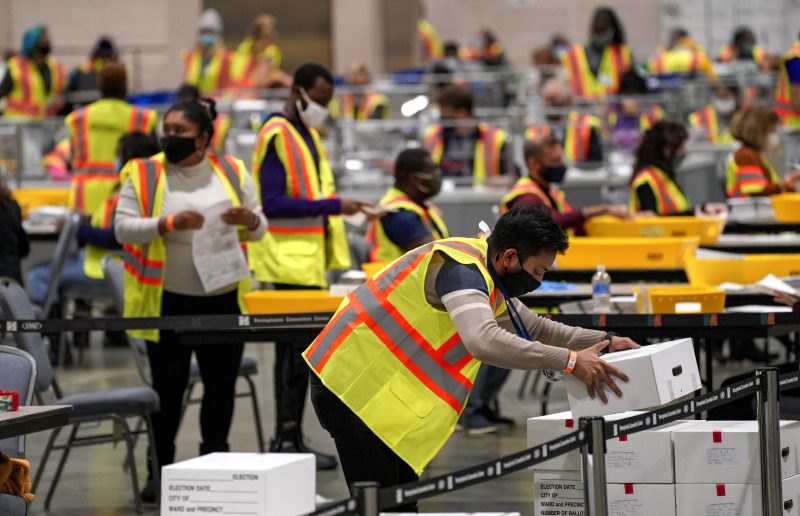When Pennsylvanians vote by mail, they must seal their ballots inside secrecy envelopes and place them into outer envelopes that they are required to sign and date. The ballots must be received before 8 p.m. on Election Day. Local election workers track when ballots arrive.
In recent elections, if a voter misdated or forgot to date the outside envelope, their otherwise valid ballot would be thrown out. But last month, a panel of state judges ruled that not counting those votes over “meaningless and inconsequential paperwork errors” infringed on the state’s constitutional right to vote.
Now, with weeks to go until Pennsylvanians start voting, Republicans are pressing for the state Supreme Court to overturn that decision, arguing that mail-in ballots without a proper date should be tossed out.
The effort is part of a nationwide legal campaign that the GOP has waged since 2020 to reject mail-in ballots. Republicans say the litigation is aimed at enforcement of election law, down to the letter. But critics see a strategy that has nothing to do with election integrity and everything to do with disqualifying voters who cast ballots by mail, an overwhelming majority of whom support Democrats.
“If you talk to election officials, we will tell you that date is utterly meaningless. It serves no purpose to our operations for administering elections,” said Forrest Lehman, director of elections in Pennsylvania’s Lycoming County, a GOP-leaning area in the center of the state. “I got into this business to count ballots not to look for excuses to throw them out.”
Republicans have engaged in similar legal battles to throw out mail-in ballots over technical reasons in other states, including those, like Pennsylvania, considered crucial to the outcome of the presidential vote.
In Wisconsin, where voters are required to have witnesses sign their mail-in ballots, Republicans unsuccessfully sought to have votes rejected if the witness fills in an incomplete address.
In North Carolina, Republicans are suing to throw out ballots if the inner secrecy envelope isn’t fully sealed.
In Georgia, Republicans have fought to have ballots thrown out if voters fail to accurately write their birth date on the outer envelope.
In Michigan, Republicans sued for stricter enforcement of signature matches on mail-in ballots.
And in Nevada, which allows mail-in ballots to be received up to three days after Election Day as long as they are postmarked on or before that day, Republicans sued in May not to count late-arriving votes.
In most cases, GOP lawyers point to specific rules or laws that they say should invalidate the ballots. But sometimes they are blunt about the political motives.
In an April filing in a Minnesota case over mail voting requirements, Republicans cited data showing that mail-in votes were more likely to be cast for Democrats. As a result, the GOP brief concluded, it was “reasonable” for the party to “fear that if duly enacted restrictions of voting by mail go unenforced, the resulting increase in mail ballots may impair their prospects for electoral success.”
Claire Zunk, spokeswoman for the Republican National Committee’s voting and elections division, said “signature and date requirements are commonsense and commonplace, and this should be no different for voting. Defending the law and protecting critical mail ballot safeguards gives voters confidence that ballots will be counted in accordance with the law.
Democrats and voting rights advocates describe Republican efforts to discredit mail-in voting and to throw out ballots on technical grounds as an attempt to suppress votes, potentially thousands, in battleground states where the presidential election is expected to be extremely close. Pennsylvania is pivotal to Vice President Kamala Harris’s chances of beating GOP presidential nominee Donald Trump in November. The state chose Trump over Hillary Clinton in 2016 by less than a percentage point and then Joe Biden over Trump in 2020 by only a slightly larger margin.
“It is a cynical attempt to limit the number of votes and limit the ability of certain voters to participate in the electoral process,” said Uzoma Nkwonta, an attorney with the Elias Law Group, which represents the Harris campaign. “And I don’t think there’s any attempt to hide that anymore.”
Rules for voting by mail became a major issue during the 2020 presidential campaign when a massive influx of voters cast ballots remotely because of the coronavirus pandemic. Ahead of that election, Trump and his allies cast doubt on the integrity of mail ballots and urged his supporters to vote in person. After the election, his campaign sued to stop the counting of mail-in ballots in Pennsylvania even though nearly 1 million statewide votes had not yet been tallied. Trump and his attorneys baselessly claimed there was widespread cheating in mail ballots that helped cost him the election.
Since 2020, Republicans have continued to publicly rail against mail-in ballots, even as they have launched an initiative aimed at getting their voter base to use every available option to cast ballots, including voting by mail.
Trump released a social media video last week encouraging his supporters to vote by mail. But several days earlier, at a rally in Pennsylvania, Trump told the crowd “the elections are so screwed up,” and “we want to get rid of mail-in voting.” In recent days, he’s amplified his attacks on elections, threatening “long term jail times” to those responsible for “cheating and skullduggery” in the 2020 election.
Trump escalated the issue on Sunday, baselessly charging in a social media post that “20% of the Mail-In Ballots in Pennsylvania are fraudulent.”
“Here we go again!,” he wrote. “Where is the U.S. Attorney General and FBI to INVESTIGATE? Where is the Pennsylvania Republican Party? We will WIN Pennsylvania by a lot, unless the Dems are allowed to CHEAT. THE RNC MUST ACTIVATE, NOW!!!”
Democratic Gov. Josh Shapiro responded on X on Monday that “if Trump really wants to start this again, let me remind him of 2020: we beat him in court 43 times. We’re ready to defend our democracy again.”
The question of whether mail-in ballots with missing or inaccurate dates on the envelopes should be counted has ping-ponged through the Pennsylvania courts the past several years.
In 2022, when Pennsylvanians were voting for governor and a U.S. senator, the state Supreme Court ruled that mail-in ballots with a missing or inaccurate date on the envelope should not be counted. That resulted in thousands of votes being invalidated. For ballots received before Election Day, officials in some counties alerted voters that theirs were going to be thrown out and gave them the opportunity to cast replacement votes. In other places, voters weren’t notified, and votes were rejected.
The court decision was in effect for the 2024 primary, resulting in thousands of discarded votes. Shapiro’s administration announced in July a redesign of the outer envelope to include preprinting the year, “2024,” so voters need to fill in only the month and day in hopes of reducing the number of votes thrown out over a mistake.
Democrats in the state legislature have pushed to change the law to say the date isn’t a requirement, but the legislation never made it to a vote.
Jeff Greenburg, a former election director in Mercer County who now works for the Committee of Seventy, a voting rights group, said the issue is “painful” for election officials.
“It has always been a difficult issue for election administrators to enforce a law which I think most recognize had no real value in determining the validity of the voter,” Greenburg said.
Election officials “are very clear that the date is not used to determine eligibility or whether a ballot was received in compliance with the law,” said Philip Hensley-Robin, executive director of Common Cause Pennsylvania, one of the voting rights groups that brought a lawsuit challenging the provision. “The free and equal elections clause means you can’t disenfranchise somebody because of an irrelevant paperwork error.”
The Pennsylvania Commonwealth Court ruled on Aug. 30 that throwing away ballots over the date on the outer envelopes unconstitutionally interfered with people’s right to vote.
But Republicans argue that elections need rules and that the courts have no power to disregard rules enacted by the legislature “because a voter failed to follow them.” They also contend that voters in Pennsylvania can go in person to the polls if they don’t want to comply with the dating provision.
“The rules are set by the legislature ahead of time, and we should help people to make sure that they can follow the rules,” said Chad Ennis, vice president at the Honest Elections Project. “But at the end of the day, you know, folks have to do it. If we don’t have these rules, we’ve kind of just got chaos.”
The case is now with the state Supreme Court, where justices have set an aggressive schedule for dealing with election-related cases. It is expected to be decided before the state begins counting votes, which in Pennsylvania cannot begin until Election Day.
Kyle Miller, the Pennsylvania policy strategist for Protect Democracy, said that the rule is arbitrary and that the state Supreme Court’s ruling should reflect that.
“It’s just gotcha, a chance to disenfranchise voters,” Miller said. “It’s definitely not a pro-voter policy.”




























